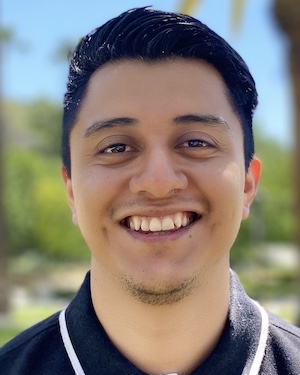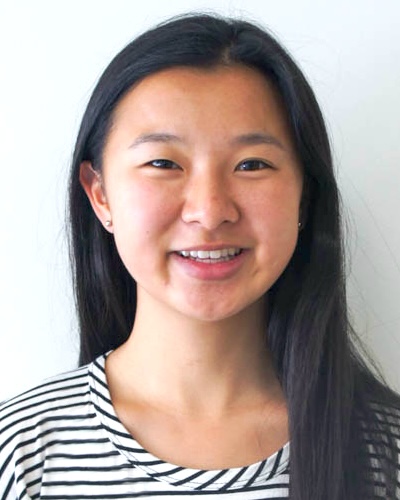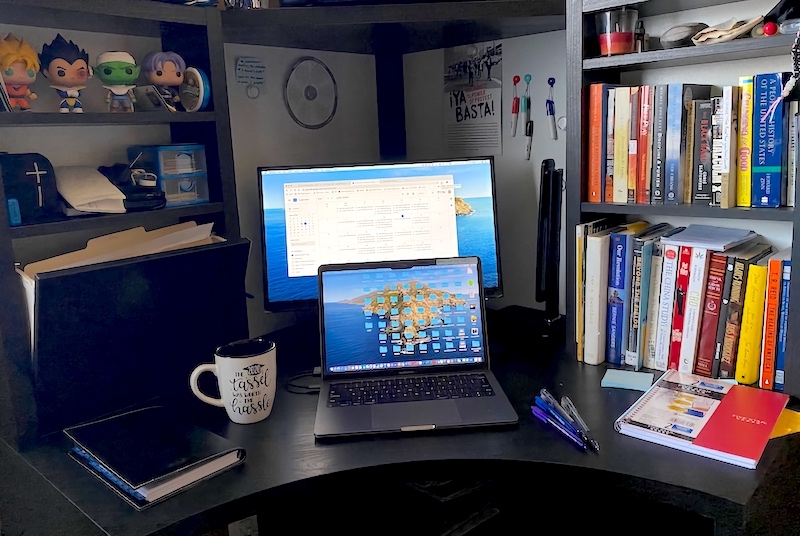Student Blog
Life Hacks

Meaningful Occupations and Routine Changes During Quarantine ⟩
July 1, 2020, by Daniel
Fieldwork Life Hacks
During the COVID-19 pandemic many of us have lost our normal routines and had to either adapt or stop engaging in certain daily occupations. Occupations are activities that we need to do, want to do, or are expected to do in our everyday lives. Everyone has a different definition for what a meaningful occupation is, for example, going to school, working, taking walks, interacting in the community, etc. Social distancing has changed the way we work, socialize, and how we take care of ourselves. Right now, more than ever, occupational therapy plays a crucial role in guiding patients through the process of creating and/or adjusting habits and routines that are personally meaningful and health promoting. Occupational therapy has the ability to address the physical, mental, and spiritual wellbeing of individuals.
During my remote fieldwork at the LAC+USC Adult West clinic, I have had many conversations regarding increased levels of fear, anxiety, anger, and depression. These are completely normal feelings to have during a time of so much uncertainty. People are worried about their health, financial responsibilities, food insecurity, their loved ones, social injustice, etc. Furthermore, the inability to engage in their usual daily occupations has taken a toll on many of the patients at the clinic. Yet, it is important that we do not let these feelings control our lives, and instead, find healthy ways to cope with these feelings and find ways to begin to engage in meaningful occupations. For example, many people are worried about not being able to work which leads to stress and anxiety about how they will provide for their families the longer this continues. To many this is an extreme change in their lives and are not able to engage in what they have considered a meaningful occupation (working) for the last 10-20 years. Often, our phone visits will focus on exploring coping strategies to manage stress or anxiety, and connecting them to resources that may support them with basic necessities. Without the ability to take care of their basic needs, patients have difficulty focusing on managing their health. Furthermore, we support patients by finding ways to increase activity level and engage in safe/appropriate socialization.
Below are some resources that you can use with your future patients and for yourself:
Patient Resources:
- My Therapist Aid: A tool for mental health professionals that includes worksheets, audio, videos, guides, interactive activities, and products. Resources can be searched by topic to tailor activities to client’s needs (i.e. stress, anger, anxiety, depression, grief, self-esteem, relaxation, substance abuse, etc.).
- Mindful USC: free app with guided meditations, as well as information about mindfulness classes, retreats and events in the community.
- UCLA Guided Meditations: different types of free meditations in English and Spanish, that can be played as audio or read using a transcript. The meditations can also be accessed via the “UCLA Mindful” app for free.
- YouTube meditations: YouTube is a great resource for many of our patients because it is free and it has so many options! Patients can explore different types of meditations such as guided meditations, sleep meditations, meditations with music, etc.
- Deep Breathing: a relaxation technique that focuses on taking slow deep breaths to provide relief from stress and anxiety. This reminds you to breathe, bring that heart rate down, and relax your muscles.
- 211LA: A hub for community members and community organizations looking for all types of health, human, and social services in Los Angeles County.
Personal Coping Strategies:
- Music/Lo-Fi Music: Music has always been a coping strategy for stress and anxiety for many years. More recently, I really enjoyed simply playing lo-fi music, which is a type of music that is mostly beats.
- Exercise: Strengthening exercises and running have been one of my biggest coping strategies during moments of stress. Since gyms began to close, I had to re-invent the way that I exercised at home. I started to do more bodyweight exercises and lots of stretching!
- Reading: I know this probably sound exhausting because we usually already have so much to read for school or work! However, I have found it therapeutic to spend at least 20 minutes per day reading books I have genuine interest for and does not feel like more work. A strategy I have been implementing is setting a timer for 20 minutes to read every day.
As I reflect back on the first 7 weeks of fieldwork, I have learned a lot from hearing patients’ personal experiences under these life-changing circumstances. This has been a challenge as I try to support them through a computer monitor and phone. However, this experience has also improved my problem solving, communication, and collaboration skills as the clinic team finds ways to better support patients. This experience has served as a reminder that occupational therapy provides the adequate training to help with challenges that occur when a person is confined to home and is unable to engage in their meaningful occupations.
⋯

Reflection: Moving Back Home ⟩
June 22, 2020, by Bethany
Life Hacks
This past March, I moved back home. It was a strange enough transition: leaving school for Spring Break and not returning, and my brother also came back from college in Texas. What made it all the more strange was realizing that I’m staying. For all four years of my undergraduate career, I chose to stay out by the University Park Campus, making it easier for me to meet new people, get to class easily, and be a part of school organizations. However, for the OT MA program, most of the people, classes, and organizations are on a different campus, the Health Sciences Campus, which happens to be a commute-able distance from home.
But even during the end of the school year, as I completed classes on my computer, I realized that staying at home does not mean a change in which occupations I participate, but in the way that I do so. I still spend most of my day in class, even if it is online, and I can still make time for people after class, in Bible studies, Zoom chats with friends, or even playing online games. Many of my other friends finishing undergrad are also moving back home to commute, so I am not alone in this transition. In fact, some of my high school friends are also coming back home, one of them joining me at USC through online-in-person-hybrid classes as a new student at the PT school. The classes and labs that we attend in person will be in the same building!
Some of the occupations that have changed are centered around family. I now have more accountability for working out, as my mom and I complete workout videos together. My parents cook amazing meals, and as we sit around the dinner table, we get to reflect on past memories, discuss what happened at work or school today, or even have difficult conversations about current events. One of the best new occupations is watching TV shows with my parents. I did not grow up with TV. When I left for college, we had a tube television in our house, so I discovered TV shows in college. After I left, my parents replaced the TV (and me) with our family’s first flatscreen. Shows like The Mentalist and Monk became their favorites, and I got to join in on watching with them after dinner. I am blessed to have a home to come back to and a place to be as I finish up my Master’s, and I’m excited to see how I adjust and grow to both new and changing occupations.
⋯

What This Period of Chaos Has Taught Me ⟩
June 12, 2020, by Nmachi
Life Hacks
It’s safe to say that the past few weeks and months have been nothing short of confusing and chaotic. It is so easy to get into the habit of complaining without striving toward finding beneficial solutions. Here’s a few things that I have learned over the past 3 months:
1. Spending time with family is necessary.
Due to COVID-19 health restrictions, all USC students were encouraged to return home to quarantine beginning in late March. This news was not pleasant for the majority of the student body, but I was especially bummed because that meant that I would not be able to complete my freshman year of college on campus.
Moving back home was definitely bittersweet. On one hand, I was disappointed because I wanted to spend the remaining two months of the semester with my friends while enjoying the last bit of the traditional dorm life. Alternatively, I was grateful to be healthy and to be able to go back home to my family. While being quarantined, I’ve utilized this time to the best of my ability; I have successfully created an at-home workout regimen that I do with my sister, played extensively with my two-year-old nephew, and caught up on my favorite shows! Making memories with my family while being at home has been very rewarding and was possible because of the current global situation.
2. Take time to reflect and better yourself.
One of the goals I made at the beginning of the year was to read more. Sounds simple enough, but being a full-time college student and young-adult, it can be difficult to put down the phone and pick up a captivating read. Nevertheless, this time of social distancing has provided me with the opportunity to focus on bettering myself as an individual by reflecting and taking in useful knowledge through reading. My latest read was The Four Agreements by Don Miguel Ruiz, which is a self-help book that emphasizes the importance of finding inner peace and self-love before trying to be that peace and love for others. I have learned that taking a moment to just be still and reflect daily can truly change the entire trajectory of your whole day.
3. Educate yourself with local/global issues. It’s crucial to stay up-to-date.
It may seem obvious, but staying informed on issues regarding the well-being of this country is vital. Just because a recurring tragedy doesn’t directly affect your community does NOT mean that you should remain silent and complacent; it should urge you to stand up for what is right by all means (verbally, financially, etc.).
During this remote time away from our regular schedules, I implore you to take these tips into consideration. You will be surprised at how much you can evolve for the better!
⋯

A Busy Day in Primary Care Fieldwork — from Home! ⟩
June 11, 2020, by Daniel
Fieldwork Life Hacks
This summer I am doing my level 2 fieldwork with my OTD residency site under the Lifestyle Redesign for Chronic Conditions Lab (LRCC) in primary care at the LAC+USC Adult West Clinic. This OTD residency is designed to expand occupational therapy (OT) services in primary care, focused on addressing chronic condition management among patients with diabetes and/or hypertension, using a Lifestyle Redesign® approach. This summer I am being trained by the current OTD Resident in preparation to take over the full caseload this Fall.
Currently, the primary care clinic does not have a video platform and we are not allowed to use Zoom to interact with patients, thus all of the appointments are three-way phone visits using Doximity (HIPAA compliant) with supervision from my clinical instructor (CI) through the phone and Zoom. I am able to lead appointments in English and Spanish, which is valuable for our predominantly Spanish speaking community at the clinic. The phone visits can be beneficial for some patients as they don’t have to travel far to get to their appointments and can talk to their providers from the comfort of their home. However, there are also barriers for our patients such as not having a quiet space at home or disconnected phone lines due to being unable to pay their phone bill as a result of the pandemic. We do our best to contact all our patients and provide as much support as possible to help them navigate these barriers and be able to manage their health.
Each day can look very different when doing telehealth in primary care, and below I wanted to share an example of a typical busy Wednesday! On this particular day, I started my day with an OTFP in-service learning about mental health when utilizing Lifestyle Redesign® approaches. Next, my CI and I started calling patients since we had done chart reviews the day before. During our phone visits, we discussed topics such as healthy eating, physical activity, stress management, medication adherence, habits and routines, resources, etc., to support their diabetes and/or hypertension diagnosis and overall health management. In the middle of the day we had consecutive meetings to discuss patient progress and how to better support them (care management); fieldwork/residency updates, logistics, and an opportunity to ask for guidance with clinical approaches (fieldwork supervision); and daily clinic updates and projects (daily brief). And perhaps you are wondering . . . when do you eat? Well, there are days when we don’t get an official lunch break, so we do our best to get food in between meetings! Thereafter, we began calling patients again for the rest of the day and documented in between appointments and during our assigned admin/documentation time at the end of the day.
Typical Wednesday
- 8-9AM – Occupational Therapy Faculty Practice (OTFP) In-Service
- 9-11AM — Patient Phone Visits
- 11AM-12PM — Care Management Meeting
- 12-1PM — Fieldwork Supervision Meeting
- 1:05-1:30PM — Clinic Daily Brief
- 1:30-4PM — Patient Phone Visits
- 4-5PM — Admin Time/Documentation

My workspace at home (please don’t judge my ergonomics/set-up, I’m still working on it).
Tips for working from home
- Take stretch breaks: This is one of the most important things you can do for your body. Taking stretch breaks is important to prevent pain, aches, and cramps later on! You can even do stretches while sitting down.
- Snacks & water: Don’t forget to stay hydrated and have snacks in reach to have energy throughout the day!
- Ergonomics: Posture, posture, posture! Please take care of your bodies and follow proper posture and chair tips when working from home. This can easily be overlooked and if you don’t have fancy equipment, there are ways you can get creative! Your body will thank you later.
- Prepare meals: This can save you time on days when you may have a short lunch break or none at all!
I hope this paints a picture of what a busy day of telehealth primary care may look like! My intention is to be transparent with you all and share the good, the bad, and the busy days. I am often exhausted at the end of the day, but I am excited to continue to learn and the patients make it all worth it!
⋯

A Whole New Virtual World ⟩
June 9, 2020, by Bethany
Life Hacks
During this time of social distancing, we’ve learned that it can be difficult to stay in touch with people. Especially as college students, moving away from campus and being back home was quite a transition. And my class’ position as seniors only amplified our experience. We were planning on cramming last minute hang outs together into our final weeks, making the most our proximity, but those weeks never came. However, over time, we began to get creative with the ways that we stayed connected. And even as things slowly open up, there are still some creative ways to stay in touch that we will continue to do.
Zoom Game Night
One of the student organizations I was a part of was Intervarsity Trojan Christian Fellowship. We have a tradition of having Senior Office Hours through the last week for the seniors to hang out with everyone in the fellowship. Organizing these virtually was difficult, but we found a lot of fun games that work over video chat! One of my personal favorites (and one at which I am unfortunately not that great) is Codenames. In Codenames, you work with your team to help them make the correct selections on a grid of 25 random words by using only one word clues.
Skribbl.io is an online version of pictionary that has one player draw at a time while the others type in guesses. It is even more fun to add the element of video chat to watch everyone’s reactions to the others’ drawings, sometimes bemoaning their own artistic ability. Be careful, though: Spelling counts on this game! Although the program will let you know when your answer is close, you still have to spell it correctly for the answer to go through. One word given was Colosseum, and although the participant drew a beautiful rendition, her audience unfortunately consisted of USC seniors, who were all too familiar with the Los Angeles Memorial Coliseum, where our football team plays every home game. Watching the numerous attempts and re-attempts at spelling was frustrating, but garnered laughs all the same.
You can find many more games here, on a list compiled by another socially-distancing college student. The list is even organized by type of game, from board games to card games and even escape rooms! The author is ever updating the list, so if you have site recommendations, you can send them her way through the link on the document. You’ll find some old favorites, but I highly recommend trying something new, too! I learned Settlers of Catan through the online version, a challenging but overall fun experience.
Team Challenges
My family has taken this time to keep in touch with extended family members as well. Through Marco Polo, a video messaging app, each group of cousins takes turns challenging the other families to post a video in the group. The first challenge was a family dance challenge, where each family choreographed and performed a 30+ second clip. Then we sent the videos to our grandparents, and they came up with their own categories of choreography, enthusiasm, costuming, and more to rank each performance. I’m proud to say that my family got top marks for enthusiasm when the dog showed up wearing sunglasses for the opening. We’ve also done challenges for mimicking old family photos, recreating a movie scene, and re-writing the lyrics to a song to reflect our social distancing experiences. The challenges are a great way to stay in touch, keep younger cousins busy, and see everyone’s creative side!
Start A Series
Now that we know that many of our gatherings will continue online, what better time to start a series with someone. Netflix Party is one app that allows different users to simultaneously watch the same content. If the content is not through Netflix, there is also a screen-share option through video chat. Anything from TV shows to different movie series, Friends to Harry Potter. Having a series is a nice way to keep continuity and to ensure that you regularly stay in touch with your watch group, because you can’t not watch the next installment!
These are only a few examples of the many ways we’ve learned to keep in touch as the world changes. And even in the future, as things open back up, I look forward to continuing to use these strategies to maintain relationships. Hopefully, you can take advantage of some of these suggestions or come up with some creative ones of your own!
⋯





